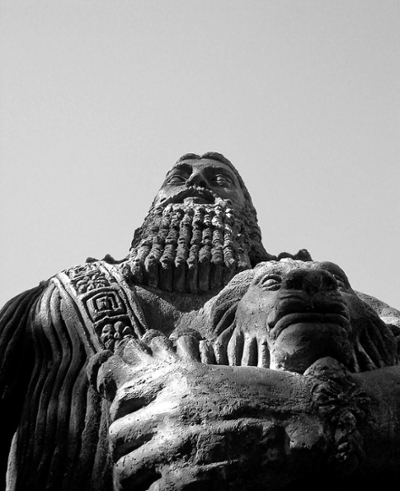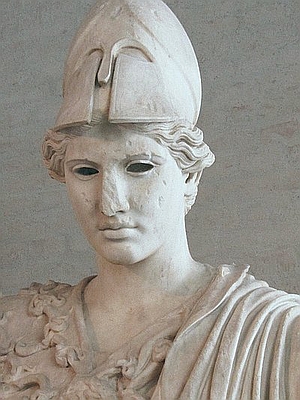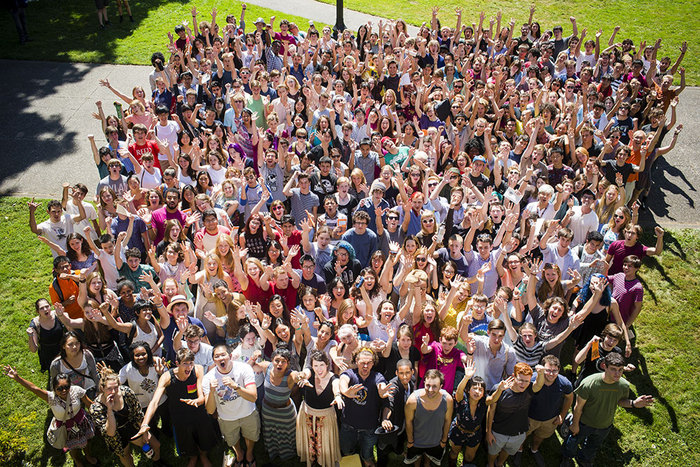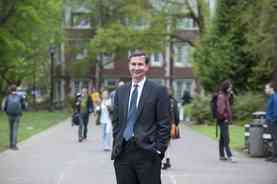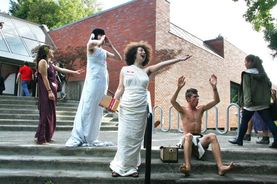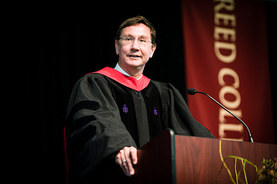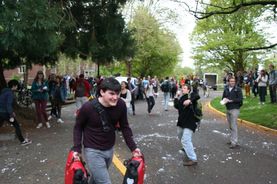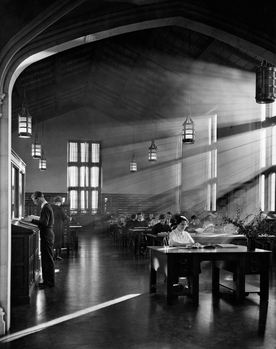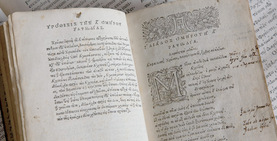
IRIS login | Reed College home Volume 96, No. 2: June 2017
Tags
"Hum 110"
The Debate over Hum 110
Intellectual discovery, academic rigor, robust debate, and the pursuit of knowledge—these qualities have defined Reed since its first classes in 1911 and are the tenets that inform the interdisciplinary course known as Humanities 110.
The goals of Hum 110 are to introduce students to college-level work, illustrate Reed’s distinctive approach to teaching, and provide rigorous writing instruction. Through critical engagement with significant works of literature, art, and architecture, students learn to transform experience into meaning.
The course is evaluated by faculty every 10 years and is under review now, during fall 2017. The decadal evaluation was moved up one year in response to the urging of the student group Reedies Against Racism (RAR). The results of the review will be presented in late fall 2017.
Continue reading The Debate over Hum 110
The Philosophy of Pain

Pain has deep philosophical implications, according to Prof. Troy Cross, especially when it comes to Hum 110.
Pain.
We all feel it. Most of us avoid it. Some of us dread it.
But as Prof. Troy Cross [philosophy] pointed out in a startling and memorable Hum 110 lecture on October 31, pain is a fundamental fact of existence that has deep philosophical implications for education and for the current debate over Hum 110.
Continue reading The Philosophy of Pain
Profs vote to accelerate Hum 110 review
In the interest of keeping colleagues, students and staff informed about events initiated by the Black Reedies Matter movement that have specific bearing on the Humanities 110 course, we would like to share the following.
1) In the spring of 2016, pursuant to SCAPP’s survey of student satisfaction with Hum 110 and its own survey of Hum 110 faculty opinions, the Hum 110 faculty charged two sub-committees to work on revisions to the Hum 110 syllabus over the course of the summer of 2016. The work of the first committee, proposing more explicit study of gender, class and race in the ancient world, will be presented to and discussed by the Hum 110 staff during the first week of November. The work of the second committee, proposing the addition of the study of Islam, will be presented to and discussed by the Hum 110 staff during the second week of November. In the short term, the staff is discussing changes to the spring syllabus (in no way intended to foreclose on long term solutions).
2) At the conclusion of an open meeting between the BRM student leaders, the Hum 110 faculty, and many concerned students in the Student Union on October 6th, it was agreed that a committee of at least six volunteer Hum 110 faculty and six volunteer BRM students would meet regularly to discuss the best process for Hum 110 syllabus revision. Meetings will start in the first week of November.
Continue reading Profs vote to accelerate Hum 110 review
Spirited Debate Breaks Out Over Hum 110
In masterful fashion, Prof. Lena Lenček took the lectern last quarter and delivered a classic lecture on the ancient Greek poet Hesiod before an audience of 300 students in Hum 110. Ranging from the myth of Prometheus to the songs of Bob Dylan, Prof. Lencek zeroed in on the central issues posed by Hesiod’s epic Works and Days. Is toil a virtue? Are the gods just? Is it acceptable to use guile in pursuit of justice?
Sitting in the back of the lecture hall, I couldn’t help but marvel at her dazzling dissection. It reminded me of everything I loved about Hum 110 when I was a student in the ’80s, frantically scribbling notes and smoking Camels.
But times change, and Hum 110 has emerged as a campus flashpoint this semester. As racial tension in the United States has been ratcheted up by police shootings and ongoing racial inequalities, some students have called out Reed’s signature humanities course as an example of institutional racism. Following a campus demonstration last month, student critics have unfurled a lengthy catalogue of problems they perceive and proposals to fix them, such as this one printed on the front page of the Quest:
Continue reading Spirited Debate Breaks Out Over Hum 110
Adventure Begins for the Class of 2020
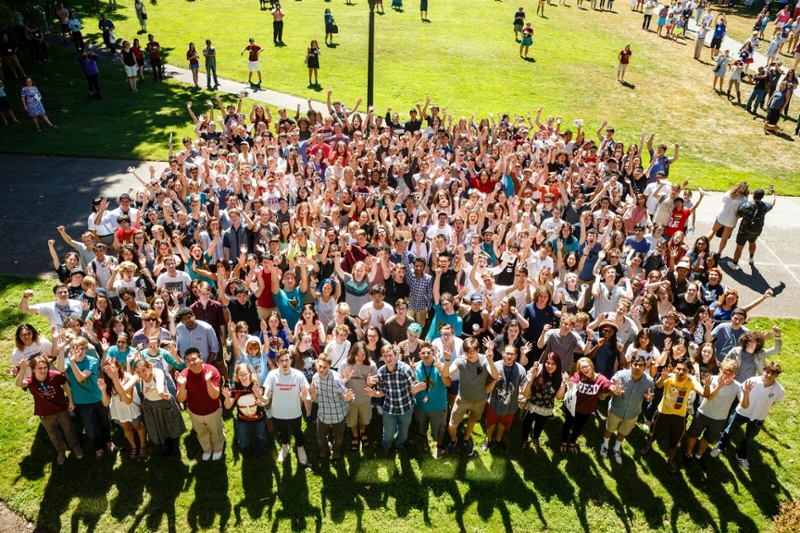
HAIL, HAIL, THE GANG'S ALL HERE. Class of ’20 converges on the Great Lawn at Convocation. Photo by Leah Nash
The trumpeting fanfare of Handel’s Music for the Royal Fireworks marked the beginning of convocation on Wednesday, as Reed welcomed the Class of 2020 to campus. In addition to the robes and the regalia, there was both wordplay and swordplay, courtesy of Prof. Darius Rejali [political science 1989–], who delivered the year’s inaugural Hum 110 lecture on the question of friends and enemies in the Iliad, punctuated by the cut and thrust of a saber (Prof. Rejali is a fencing enthusiast).
Some 357 strong, the Class of ’20 boasts some formidable statistics: 10% were valedictorians of their high school classes and another 2% were salutatorians. 32% ranked in the top 5% of their class. The median scores on their SAT tests were 680 math, 710 verbal, and 680 writing, which puts them at the 96th percentile.
The class was drawn from the largest pool ever—5,705 applicants—and is the most selective in Reed’s history, with an admittance rate of 31%. Another 42 students entered as transfers.
Continue reading Adventure Begins for the Class of 2020
Pantheon Returns, Fully Clad

Olympian applauds as incoming student pours libation on steps of Vollum moments before the first Hum lecture of the year. Kevin Myers
As dawn’s rosy fingers hid behind the morning clouds, droves of freshlings on their way to their first Hum lecture encountered a spectacle wondrous to behold—a fully clad Pantheon of Olympian gods and goddesses greeting them on the steps of Vollum.
“Welcome!” cried the immortals. “You’re a Reedie now!”
The Pantheon is a light-hearted student tradition that celebrates Humanities 110, Reed’s signature multidisciplinary course which starts with the Epic of Gilgamesh and wends its way through the Code of Hammurabi, the Book of the Dead, Genesis, Exodus, the Book of Job, the Oresteia, the Iliad, Sappho, Herodotus, Thucydides, and Euripides (and that’s just the first semester!) The Gods welcome new students to the course and ask them to pour libations on the ground, re-enacting a Homeric custom.
Continue reading Pantheon Returns, Fully Clad
So, What Turns You On?
Beneath the deep arches of the white tent on the Great Lawn, 414 freshmen and their parents and friends rose as the faculty marched in stately procession Wednesday to mark Convocation 2014. President John Kroger welcomed the students of the class of 2018 and—noting that some in the class would take five years to graduate—the class of 2019. “And if you already think you may wind up in the class of 2020, please come see me after,” he added. Kroger spent the rest of his remarks distilling for parents and friends the experience of being a Reedie: Humanities 110, collaborative work with faculty and students, and Portland’s unique culture, which, according to Kroger, students would have no time for.
Professor Jay Dickson [English 1996–] gave the inaugural Humanities lecture, titled “Everything You Ever Wanted to Know: The Iliad and the Enkuklios Paideia.” Prof. Dickson’s lecture centered on the meaningfulness of Homer’s Iliad to a liberal arts education. Why, he asked, is Homer’s epic so important to a Reed education that all incoming freshmen are required to read it even before the first week’s classes? The poem’s vast array of stories and characters proved foundational to an ancient curriculum. Students would learn reading, writing, rhetoric, and other subjects by using the poem as a point of departure. Thus, just as the Iliad invited the ancients to extrapolate from Homer’s story into other fields of knowledge, so the epic encourages freshmen to do the work of critical extrapolation, the foundation of a Reed education.
Ivan Sutherland, visiting scientist at the Asynchronous Research Center at Portland State University, received the Vollum Award. Sutherland encouraged the freshmen to follow their academic interests by posing a single question: “So, what turns you on?”
Continue reading So, What Turns You On?
The Dipylon Analogy
Dear Reed Alumni:
The academic year is underway! The campus looks beautiful, the Paradox Café is packed, and the mood on campus seems excellent. My enthusiasm for Reed, and my conviction that the college is in great shape, have only grown deeper in the last two months. I look forward to my formal inauguration on September 21 and the accompanying Alumni Leadership Summit. I hope to meet many of you at these celebratory and informative events.
Continue reading The Dipylon Analogy
"Libations!" They Cried
Monday morning, 8:45 a.m. First day of class. As the new crop of freshlings streamed towards Vollum for their first real Hum lecture, laden with backpacks, and clutching coffee cups and water bottles, they were greeted by an unusual spectacle: a veritable pantheon of Greek gods hooting and hollering on the steps outside the lecture hall.
"Libations!" cried the gods. "Libations to honor mighty Zeus!"
Continue reading "Libations!" They Cried
Convoking the Muse
Students, parents, and professors descended in their multitudes upon the Great Lawn on Wednesday for Convocation 2012. Under the billowing big top, 358 newly-minted Reedies were formally inducted into the tribe by an equally fresh president: John Kroger kicked off the ceremony with his first public address as head of the college. Kroger remarked that what he has been struck most by in his first eight weeks cannot be conveyed in a brochure: "Reed is one of the warmest kindest, most welcoming institutions I have ever experienced," he said. "It feels like home."
Home may now be Anna Mann or Foster-Scholz for new students, but they came from all over the globe to get here. Keith Todd, dean of admission, laid out the impressive pilgrimage; students hailed from China, Kenya, New Mexico, and Jakarta, among others. They include more Texans than Minnesotans, several Nicholases and Katherines, not to mention a Thor and a Zeus.
Continue reading Convoking the Muse
The Pelting of the Freshmen
Eliot Circle erupted in a flurry of snowballs this morning as upperclassmen enacted a relatively new tradition, the Pelting of the Freshmen, after the final Hum 110 lecture of the academic year.
Unidentified upperclassmen (rumored to include Seth Douglas '13 and Jeremy Lawrence '12) drove a pickup truck to Mount Hood, loaded the bed with snow, and lay in wait for the unwary freshlings to emerge from Vollum. Cheers rent the air as the youngsters streamed down the steps and the icy fusillade commenced.
Continue reading The Pelting of the Freshmen
"The Last Great Conservative College"
An article in the latest edition of Portland Monthly describes Reed as "America's Last Great Conservative College." And yes, the author is a Reedie.
Citing Reed's demanding requirements and classical curriculum, history major Ethan Epstein '10 makes a persuasive case that most Portland residents are looking at Reed through the wrong end of the microscope.
"As a Reedie, I long ago accepted that most Portlanders consider my alma mater a hybrid of Haight-Ashbury and Keith Richards's medicine cabinet," he writes.
Continue reading "The Last Great Conservative College"
A Song of Two Syllabi with Prof. Wally Englert
The first lines of Homer's Iliad reverberated to the carved rafters of the chapel on Friday as Reedies of all generations were reunited in the shared experience of reliving their first Hum lecture during Centennial Reunions. However, there was a twist. On the back of the lecture handout (distributed by a beaming President Colin Diver, who marched up and down the aisles brandishing copies) was a timeline that began, not in Greece, but in Egypt. And the Homeric epic of choice for the semester was not the tale of Achilleus and his anger, but that of Odysseus and his quest to return home. As professor Wally Englert [classics 1981-] explained, the Hum syllabus has undergone some significant changes in the past year...
"We used to say 'The Greeks were strange,'" Englert noted, while discussing the inclusion of new material from other Mediterranean cultures on the reading list, "But I'm going to do something a little radical here and say: Ancient cultures were strange."
Continue reading A Song of Two Syllabi with Prof. Wally Englert
Bringing the Humanities to Portland
Shanaquewa Finney admits the reason she signed up for the class was because the flyer advertised that it was free.
"That caught my attention. So I said, 'Let's see what this is about.'"
Continue reading Bringing the Humanities to Portland

